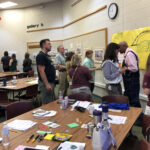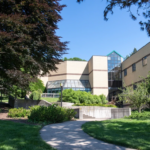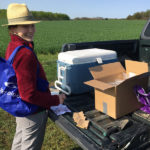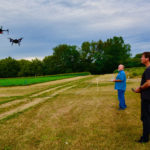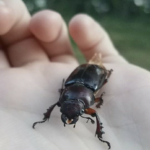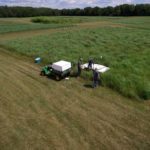Hickory Corners, Mich. — Teachers and informal educators of K-12 students are invited to engage in science teaching professional development this summer at the W.K. Kellogg Biological Station. The 24th annual K-12 Partnership Summer Institute is set for 9 a.m. to 3:30 p.m. Tuesday, June 20, through Thursday, June 22. Registration is now open! This year’s theme is “Our Changing Planet, Classrooms to Ecosystems,” and will include scientific talks by Dr. David Karowe, Dr. Lauren Sullivan and Naim Edwards. Each morning’s science talk will be followed by a series of interactive and
KBS commitment to to fostering an inclusive culture garners accolades from MSU
W.K. Kellogg Biological Station’s dedication to making diversity, equity, inclusion and social justice central to KBS culture has earned an Excellence in Diversity, Equity and Inclusion unit award from Michigan State University. The award focuses on the work of the KBS Culture and Inclusion Committee, or CIC, and its 2022 membership: Among the examples of KBS’s contributions to advancing diversity, equity and inclusion were the formation of the CIC, a focus on diverse hiring and recruitment practices, creation of a DEI advocate position, and the development of programming aimed at
New KBS LTER Artist-in-Residence program aims to create intersection between art and research
This spring, Michigan State University launches the Farmscapes to Forests: Kellogg Biological Station (KBS) Long-Term Ecological Research (LTER) Artist-in-Residence Program, which will welcome artists from across all mediums to spend a week at the Kellogg Biological Station in Hickory Corners, Michigan, followed by a culminating visit in the fall or winter to share their work. Supported by the National Science Foundation, Gretel Van Wieren, Professor in MSU’s Department of Religious Studies, is leading the program in its first collaboration with Dream Scene Placemaking,
Measuring and predicting soil carbon to offset climate change
KBS Long-Term Ecological Research scientists awarded a $3.4 million grant from the U.S. Department of Agriculture’s Farm Service Agency to study possible climate outcomes. When an unproductive swath of farmland is planted with row crops, it results in environmental damage with little to no yield. Instead, farmers can cultivate native plants in those spaces that improve soil health and support other native species. The USDA Conservation Reserve Program, or CRP, offers them financial incentives to do just that. Measuring soil carbon for improved soil health Now, Michigan State
Seeking a more resilient agriculture: the next chapter for the KBS LTER program
Imagine for a moment a Midwestern agricultural landscape in late August that has not seen rain in weeks. Some corn fields remain green, showing no sign of a moisture deficit while other fields have curled leaves, plants starting to yellow. Belowground, microbial communities between the fields are acting differently, too, some biding their time until a pulse of rain puts them in motion while others continue their work. Under the same climate and soils, why is one field more resilient to the stress of drought? What about that field helps it to remain productive? In the midst of global
Evolution in the LTER: Reflections from an LTER researcher
Each year the KBS LTER awards full and summer fellowships to MSU graduate students. MSU graduate researcher Susan Magnoli is a PhD student in Jen Lau's lab in the Department of Plant Biology. She wrote about her 2017 KBS LTER summer fellowship project. When you think about studies of evolutionary biology, images of Darwin’s finches, diverse fish communities, or beautiful tropical forests might come to mind. But what about agricultural landscapes? While they at first might not appear to be the most exciting habitats, the farm fields and biofuel crops of the Kellogg
Researchers conduct novel wheat microbiome analysis under four management strageties.
This is an original press release from American Phytopathological Society- Nov 27th, 2017 St. Paul, Minn. (November 2017)--Different crop management strategies can produce various and noticeable effects on a crop and its yield. But what are the effects at the microbial level...not just in the roots but the entire plant? Molecular biologists Kristi Gdanetz and Frances Trail of Michigan State University sought to answer that question, developing a descriptive analysis of the wheat microbiome under four common types of management strategies: conventional, no-till, organic, and reduced
A new view of farmer fields: Using drones for ag sustainability
By, Bill Krasean Sven Bohm and Kevin Kahmark are standing in the middle of the Great Lakes Bioenergy Research Center (GLBRC) field site in Hickory Corners, MI, where researchers study the sustainability of different crops grown for use as liquid transportation fuel. Each is holding a small remote control box similar to one used in video games. On the ground nearby are two small black unmanned aerial vehicles, a.k.a. drones. Soon both drones are airborne, humming quietly above the ground and zipping off in selected directions under the eye of the two drone pilots. While both
A local bestiary – the bugs & slugs of KBS: Reflections from an undergraduate researcher
KBS undergraduate summer researcher Elizabeth Postema is a senior at Denison University. She wrote about her Research Experiences for Undergraduates project working with mentor and LTER researcher Dr. Jen Lau, in her lab at MSU. Postema was funded by an NSF REU site award to the Kellogg Biological Station. ~~~~~~~~~~~~ The best part about working at a field station is getting to, very literally, connect with nature. As a participant in an REU (which stands for “Research Experiences for Undergraduates”) program at the Kellogg Biological Station, I spent most of my
Almost failing a semester to learn about climate change: Reflections from an undergraduate researcher
KBS undergraduate summer researcher Daimer Castro Vega is a junior at the University of Puerto Rico. He wrote about his Research Experiences for Undergraduates project working with mentor and LTER researcher Kate Glanville, a PhD student in Dr. Phil Robertson's lab at MSU. Daimer was funded by an NSF REU site award to the Kellogg Biological Station. ~~~~~~~~~~~~ If you know something about Puerto Rico, you might have heard that there is a huge debt and that the students went on a strike on April 7, 2017 for more than two months with only three weeks
